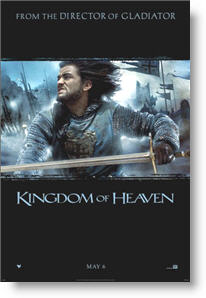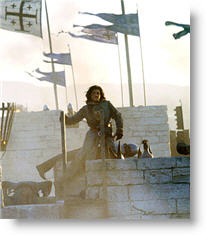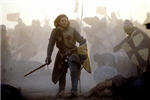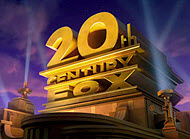Kingdom of Heaven
 for strong violence and epic warfare.
for strong violence and epic warfare.
Reviewed by: Michael Karounos
CONTRIBUTOR
| Moral Rating: | Extremely Offensive |
| Moviemaking Quality: |
|
| Primary Audience: | Adults |
| Genre: | War Action Adventure Romance Drama |
| Length: | 2 hr. 25 min. |
| Year of Release: | 2005 |
| USA Release: |
May 6, 2005 (wide release) |




About Biblical problems with Roman Catholicism
An open letter to Roman Catholics
What issues often separate Roman Catholics from God? Answer
Personal testimonies of former devout Roman Catholics
- Former priest, Richard Bennett
Former nun, Mary Ann Pakiz
Former altar boy, Stan Weber (“Falling In Love with the Biblical Jesus”)QUIZ—Catholicism and Protestantism.
Do you think like a Protestant or a Catholic?
To better understand the worldview of the creator’s of this film, read our INTERVIEW with actor Orlando Bloom and director Ridley Scott
GOD—How can we know there’s a God? Answer
ISLAM—What is Islam? What do muslims believe? Answer
RELIGION—Aren’t all religions basically the same? Answer
With so many denominations and religions, how can I decide which are true and which are false? Answer
BIBLE—How do we know the Bible is true? Answer
Is the Bible truth or tabloid? Answer
GOD—A skeptic asks: “Why should any one have to accept ancient hearsay as evidence for the existence of a god? If Jesus is who he said he was, then he shouldn’t have any problem personally convincing me of that fact, especially considering the penalty with which he is supposedly ready to zap anyone who doesn’t believe. In fact, I’d say, all things considered, he is a twisted monster for not doing just that.” Response
GOSPEL—Does Christianity need to develop a NEW gospel adapted to today’s world? Answer
SUFFERING—If there is a God, why does He allow innocent people to suffer? Answer
SUFFERING—Does God feel our pain? Answer
EVIL AND BAD—The Origin of bad—How did bad things come about? Answer
| Featuring |
|---|
|
Orlando Bloom Liam Neeson Brendan Gleeson Jeremy Irons Eva Green |
| Director |
|
Ridley Scott |
| Producer |
| Distributor |
“The Kingdom of Heaven” is not as anti-Christian as I feared and not as good an action move as I had hoped. The criticisms it has received—the miscasting of Orlando Bloom, the blatant anti-clericalism, the pretentious speeches—are, sadly, well-deserved. Aristotle famously observed that in drama “action reveals character.” Unfortunately, director Ridley Scott channels Ayn Rand and tries to reveal character through political speeches. Not surprisingly, he succeeds in revealing the viewer’s boredom instead.
The plot concerns the third of eight crusades to the Holy Lands performed in the years roughly between 1095 and 1291 A.D. The opening titles tell us that the year is exactly 1184 and that “Europe is in a state of repression and poverty.” The observant viewer can discern this even without the helpful description because everything European is dirty, shabby, and ragged. This includes not just the peasantry, but also the blasphemous priests and rapacious noblemen who, having plundered the Middle East for gold, frankincense, and myrrh, nonetheless returned looking like they’d been on a three year long drunk.
Meanwhile, everything Arabic is bed-bath-and-beyond beautiful. The Saracens have nicely coiffed hair, neatly trimmed beards, and are dressed to the nines in special dust-resistant robes with intricate embroidery. Judging by the difference in clothing, I’m confident the Catholic Church almost certainly went to war just to capture the Muslim robes. The rags the priests wear are an absolute indictment of Christian tailors.
The movie has no objectionable nudity, blasphemy, profanity, or nuance. The film plays longer than its hefty 145 minutes because (I’m guessing) Scott’s research showed that time was notoriously slower in the Middle Ages. The speeches are boring, pompous, and transparently anti-religious. The priests are poor theologians and offer spiritual guidance that one can only describe as a kind of uplifting nihilism: “I’m your priest,” one comforts Balian (Orlando Bloom). “God has abandoned you.”
This is the same priest that plunders the gold cross from Balian’s dead wife and then orders the gravediggers to chop off her head as a large cross looms behind him. Some viewers may feel enlightened by such symbolism, but Christians will notice that the only other headchopping is done by a crusader. The Prophet Mohammed instituted a scriptural basis in the Koran 500 years earlier for chopping off the heads of infidels, but Scott’s research must have concluded that it was really graveyard priests who liturgized the practice that is now such a hit with Muslim jihadists.
Besides the droll priest, there is also a bishop who has some great lines, as when he advocates jumping on the fastest horse and abandoning the people of Jerusalem to slaughter. He simpers to Balian: “It is unfortunate about the people, but,” he says, ending on a positive note, “it is God’s will.” When it’s too late to flee, he helpfully tells Balian, “Convert to Islam.Repent later.” There are various shots of monks and other clerics blessing the crusaders as they go off to do their dirty work: “To kill an infidel is not murder. It’s the path to heaven.” Whether it’s priest or crusader, massacre and the blessing of massacre is all in a day’s work. As the mad knight Reynald gleefully reflects after one of his slaughters: “I am what I am.Someone has to be!”
That “I am” speech comes dangerously close to blaspheming God’s speech in Exodus 3:14: “I am who I am.” The one relatively noble Christian, Tiberius (the name of a pagan Roman emperor), tells Balian: “The world has no need of a perfect knight.” And in that statement we can find the clearest expression of Scott’s anti-religious agenda. Christ, of course, is the “perfect knight” and look, the movie seems to say, at all the killing that’s been done in his name. In the movie’s war of words, its secular pieties are repeated ad nauseum.
The opposing idea to Reynald’s travesty of God’s speech is the Humanist commandment that Balian carved in a beam of his smithy shop: “What man is a man that does not leave the world better.” Balian’s father (Liam Neeson) tells him that he must always speak the truth, even if it costs him his life. The good king of Jerusalem, dying of leprosy, wears a silver mask and tells Balain that he will not be forgiven for wrong deeds, “Even where those who move you be kings, or men of power.” When Balian refuses to have the wicked Guy de Lusignan killed, he declares that, implicitly, Jerusalem is “a kingdom of conscience or it is nothing.” All of these speeches must be understood in the context of their antithesis: to act according to enlightened humanist principles is more rational and moral than to act according to an irrational faith.
There are two symbolic scenes at the end of the movie. In the first, during the battle for Jerusalem, we see the captured king of Jerusalem riding backwards on a donkey before the city gates wearing what looks like a dunce cap. That gratuitous anti-Jesus image will anger some Christians and cause others to roll their eyes in disbelief, but its purpose is to serve as a perfect bookend to Reynald’s speech above. Scott makes sure he mocks the Son as well as the Father. But aside from Christians, I wonder how sincere Muslims will feel about one of their prophets being mocked for laughs by the movie’s religious Muslims?
The second instance of heavy-handed symbolism occurs when Saladin picks up a fallen altar cross and sets it on a table, a gesture so ludicrous as to provide an inadvertent moment of comic relief. The battle in Jerusalem concludes with Balian leaving town while portentously pronouncing, “If this is the Kingdom of Heaven, let God do with it as he wills.”
The “Kingdom of Heaven” is not a terrible movie, although its historical assumptions are biased, incomplete, and error-ridden. For instance, there is no mention of the fact that the Muslims conquered Spain four hundred years before the crusades, They occupied Spain for nearly seven hundred years, until the fall of Granada in 1492, which might explain why the Spanish are sympathetic to Muslims. Islamic armies had even advanced into France where Charles Martel defeated them at the Battle of Tours in 733. A fair-minded observer might suggest that those wars of aggression and conquest against Christian lands might have something to do with why Christians were feeling a little cranky in 1184.
But aside from those deceptions, there is little in it to offend and less to recommend it. For those who want to see more of less, Scott is producing a 285 minute director’s cut on DVD. Fair warning: if you sit through the whole thing, your clothes may acquire that shabby look that Scott’s research has shown to be distinctly Christian.
To better understand the worldview of the creator’s of this film, read our interview with actor Orlando Bloom and director Ridley Scott (shown above)
More importantly, all the egregious anti-Christian scenes that ended up on the cutting room floor will be on full display there. One Muslim scholar who saw the full version of the film said the scenes of Muslims destroying churches would cause anti-Muslim hatred. Ridley no doubt took that sympathetic advice to heart and left those scenes out. Note: he left them out, not of sensitivity to Christian sensibilities, but out of sensitivity to Muslim ones.
My advice is to rent “Phantom of the Opera” and withhold your eight bucks from this anti-Christian plate offering. Hollywood is on a relentless crusade of its own against Christianity. Why fund more of the same?
See list of Relevant Issues—questions-and-answers.
ADDENDUM
Michael the Syrian, the 12th century Jacobite patriarch of Antioch, reproducing earlier contemporary sources in his famous Chronicle, summarized the prevailing conditions for Christians in Palestine, as follows:
As the Turks were ruling the lands of Syria and Palestine, they inflicted injuries on Christians who went to pray in Jerusalem, beat them, pillaged them, levied the poll tax at the gate of the town and also at Golgotha and the [Holy] Sepulchre; and in addition, every time they saw a caravan of Christians, particularly of those from Rome and the lands of Italy, they made every effort to cause their death in diverse ways. And when countless people had perished as a result, the kings and counts were seized with [religious] zeal and left Rome; troops from all these countries joined them, and they came by sea to Constantinople [First Crusade (1096-99)].”
Also, see articles (off-site): Jihad begot the Crusades
See list of Relevant Issues—questions-and-answers.


Average/5
Also according to each of the three major religions that are dealt with, here each faith has a rightful claim to Jerusalem. And it is true historical fact that Salidan did provide the Christians safe passage to the sea after retaking Jerusalem, in spite of the fact that the Christians killed every man woman and child in the city when that had previously conquered it. I also do not understand the condemning of the idea that all of these people of religion should live and worship in the same city peacefully, nor do I understand it being called humanistic. At the basis of each of these religions is the ultimate teaching of love and peace. That being said the film still lacked in character development and action, but overall was entertaining. The fact is that not all things done in the name of God are Godly or righteous, and the crusades is a great example of how this is true. We as christian should learn from this.
Average/4
…Nominal Christianity was what barred Jews and Muslims from entering Jerusalem in the years of the so-called “Kingdom of Jerusalem” leading up to Saladin’s recapture of the city in 1187—after which time, lo and behold, the Muslim leader “permitted worship of all religions.” (Source: “Jerusalem” in Wikipedia.org) The Columbia Encyclopedia adds: “The reputation that Saladin had among the Christians for generosity and chivalry does not seem to have been a legend” (“Saladin” at Bartleby.com). Despite whatever historical inaccuracies are to be found in KINGDOM OF HEAVEN, apparently Saladin really was a more honorable man than the nominal Christians against whom he warred…
Better than Average/4
Average/4
Better than Average/3½
There are other bigger problems then that however, not the least of which was the casting of Orlando Bloom. Maybe we’re just getting tired of his pretty face, but the film would have been much better with a more appropriate actor.See all »
Very Offensive/4½
The film comes across as more pro-Muslim than other Hollywood films but only because other films are generally so anti-Muslim. Yet, historians have noted that even many Crusaders considered Saladin a more chivalrous leader than some of their leaders. One of the central themes of the film is to do what is right and just, over what is easy. Another central theme is—follow God not religious dogma. Religion divides God unites.
Good / 4
Better than Average/4
Jesus said “…Jerusalem will be trampled by Gentiles until the times of the Gentiles are fulfilled…” -Luke 21. God finally reestablished Jerusalem in 1948 as the capital of Israel. The times of the Gentiles are coming to an end.See all »
Average/3½
Better than Average/3½
Pretending it didn’t happen only makes it look like you are trying to cover up. It’s best to acknowledge the atrocities done in the name of Christ and then explain that the reason is simple, Satan hates the name of Christ and will do anything to discredit Christianity and the Bible.See all »
Better than Average/4
The reason I found it inspiring is because it portrays a Christ-like insight of what the Kingdom of Heaven is truly all about. I think the movie can be enjoyed by any fair-minded believing Christian, when seen in light of three New Testament verses, and indeed that was my experience:See all »
Average/3
…Are there some anti-Christian undertones in the film? At times there are, no question, but people seem to be ignoring the other truths the film presents. In one instance Tyberias tells Balian, “Holiness is in right action. What God desires is here (points to his head) and here (points to his heart).” That sounds like a rather accurate description of faith and works to me. Bailian also disregards the very “religious” traditions presented to him at several times during the film and later sarcastically tells a bishop “I’ve learned a lot about religion from you” in response to his very religious advice.See all »
Average/3
Many many other inaccuracies could be mentioned, but the biggest problem with the movie was the lack of sympathetic characters. Only Baldwin IV was a truly noble character which left you not really caring about anyone. Why should I care if they lived or died if I don’t really like any of them? I do not have a problem per se with the depiction of corrupt priests or knights (as they certainly existed), but surely there are some noble priests and knights somewhere?
Overall, the movie is, like most Ridley Scott movies, well made, has beautiful cinematography, and violent. It is better than “Gladiator, but I was not a fan (Commodus DID NOT die in the arena) of that movie. If Scott had created some more sympathetic characters the movie would have been much better. As is, it is a beautiful production, but has no depth and is largely a politically correct depiction of the Crusades with Catholics as the true villains.
Very Offensive/2½
WHO CARES ABOUT GEOGRAPHY? First of all, Scott’s “Kingdom of Heaven” has its geography very wrong. We know that the film was shot in Spain and Morocco, and it shows. Most people should know that Jerusalem is not in the middle of the Sahara Desert! Yet, in his film, Jerusalem’s high walls are surrounded by sand dunes, without a tree, a bush or a blade of grass. The Mount of Olives, the Kidron Valley and the Valley of Hinnon are nowhere to be seen. Unlike the Crusaders who liberated Jerusalem in 1099, Saladin’s Army has no problem moving his siege engines and assault towers right up to the walls of Jerusalem, because Scott’s Jerusalem in “Kingdom of Heaven” is not surrounded by valleys or ditches. This film also boldly asserts that Messina was the seaport to the Holy Land. As Messina is on the Island of Sicily, one wonders why French crusaders would, or how they could, depart from there. In fact, Genoa, Venice and Naples were the ports which crusaders set sail from.
THIS IS A TRUE STORY—ONLY THE FACTS HAVE BEEN CHANGED: “Kingdom of Heaven” also distorts history beyond all recognition. The “hundred-year truce” between the Christian and Muslim armies is a figment of their imagination. The warfare throughout the 12th Century was incessant. The depiction of the Knight’s Templar as a band of religious fanatics trying to shatter the truce and provoke war with the Muslims by attacking caravans is a total fabrication. No Knight’s Templar ever attacked any caravans. Attacking caravans is what the founder of Islam, Muhammad, engaged in regularly, as did his handpicked apostles, the Caliphs. The Knights Templar were formed primarily to protect travelers from the attacks of the Muslim army. In fact, it was the slaughter of Christian pilgrims, by Muslim armies, in violation of earlier agreements of safe passage that precipitated the crusades in the first place.
The central figure of this film, Sir Balian, is a historical figure, did in fact play a critical role in the defense of Jerusalem in 1187, but the film script distorts his character and role beyond all recognition. First of all, Balian was not a blacksmith, nor did his wife commit suicide, nor was he illegitimate, nor raised as a commoner. His father, Balian the Old (not Godfrey, as in the movie), had three sons, all legitimate: Hugh, Baldwin and Balian. Balian never had to travel to the Holy Land, because he grew up as part of the nobility there. Balian was married to royalty long before the events portrayed in the film, and he was not at all romantically involved with the Princess Sybilla. (His brother, Baldwin, had some love interest in Sybilla.) In “Kingdom of Heaven,” Balian is portrayed as questioning whether God exists, although, according to the historical records, it is clear that Balian was a dedicated Christian who took his faith very seriously. Nor did Balian desert the defense of the Holy Land following the fall of Jerusalem. Far from returning to France, Balian proceeded to Beirut in Lebanon which he helped fortify against Muslim invasion. He was present with Richard the Lionhearted at the signing of the peace with Saladin, which secured safe passage for Christian pilgrims and recognized crusader control over the 90 mile stretch of coastline from Tyre to Jaffa. See all »
Moral rating: Offensive / Moviemaking quality: 3
Every single Christian in the movie lost their faith, questioned God or eventually rejected Him. On the flip side the absolute heroes of the movie were God-fearing, wonderful Muslims who showed mercy to the Christians in time of need and even embraced the belief of living in harmony with Christians. All of you who know history would consider that laughable. I have been a fan of Ridley Scott after making movies such as “Black Hawk Down”, however, now I am just saddened at his revision of true history.See all »
Extremely Offensive/1½
There were two good elements: the presence of a priest played by David Thewis, the only voice of moral courage and reason in the film, and the role of the King of Jerusalem, a truly just man. But what you wind up with is a politically correct attack on Christianity that is both unfounded, inaccurate, and offensive.
Extremely Offensive/3½
Christianity: Yes, Scott has an axe to grind—it comes through loud and clear. He is not the first nor will he be the last, but he is one of the more obvious. Wait for it on DVD.
Very Offensive/2
The theme of the movie is to preach a modern tolerance, which means we Christians need to be more sensitive, and less dedicated to our beliefs etc. Meanwhile, the Muslims are honorable and respectable. There is the assertion that Allah is the same God that the Christians worship. A glance at the Koran, Hadith or Sharia illustrates that this is not so (see http://islamreview.com). Finally, we are told that the Crusades were a ploy to make men rich. I recommend a visit to small Belgium town of Bouillon. It was here the Godfrey de Bouillon lived (the Godfrey who captured Jerusalem in 1099). His castle is worth a visit. He had to sell it and all his lands to pay for his role in the Crusade. Godfrey risked it all for this cause.See all »
Very Offensive/4
Offensive/2
Extremely Offensive/3
Offensive/3
Very Offensive/1½
Bottom line this movie represents typical liberal, bleeding heart “they are right and we are all wrong close minded” diatribe. Reminds me of anti-Vietnam movies like O. Stones movies Apocalypse and etc. I can’t wait until (a premonition) somebody in Hollywood makes a move about Abu Grab Prison or some other anti-American movie about the Iraq War. Till Then, I told you so.
Extremely Offensive/1½
I can go on and on giving history lessons. I know it was very brief and someone can easily disagree with me, but the fact is a Pope started the Crusades.
Extremely Offensive/1
Average/3
Better than Average/5
The scenery was beautiful; I loved just about every shot in the film. From the trebuchets firing to ships sinking in the sea, it looked great. Now I don’t know everything about the Crusades, but I do know that there were wrongdoings on all sides, and I think that it was portrayed alright here, not perfectly or anything, but alright none the less.
The speeches and just… pointless talking… was kind of boring, but tolerable. I am looking forward to seeing the uncut version because I want to see what the director REALLY wanted to get across. Until I see the uncut version, I don’t know where to stand on the film, because as far as I am concerned, I have not seen the entire film.
Average/3½
I am 15 years old, and I have never seen another film that has portrayed what happened in the Crusades. At the end of the day you can’t force people to become Christians, but in some countries it is illegal to become a Christian. All it does is it shows what Christians did in the past that was wrong, but that shouldn’t affect your judgment on the film. It helps you to understand more of what people who aren’t Christians think about god. Take my word for it see it for your self.
Excellent!/5
Very Offensive/4
PLEASE share your observations and insights to be posted here.


Though short, Balian’s relationship with his father is one of profound importance in which it helps mold him into the man he is to become. In short I truly enjoyed this movie. Every aspect of the production was magnificent and the actors all gave a wonderful performance. It was great to see familiar and respected actors and some new talents. I think Orlando Bloom delivered a great performance, and I look forward to following his career.
My Ratings: Better than Average/5